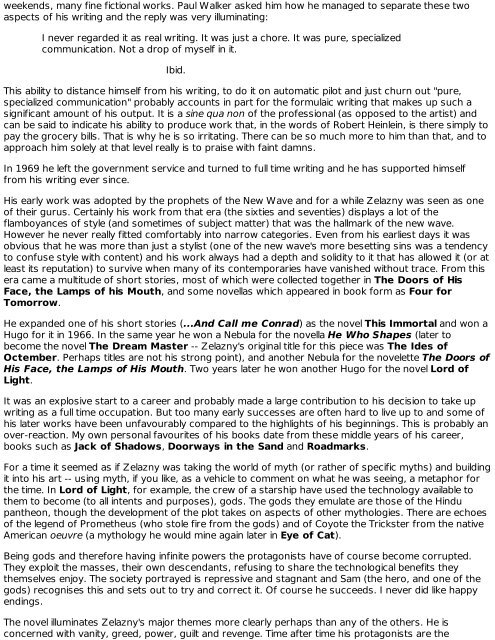Triffids Beard 2 - The Bearded Triffid
Triffids Beard 2 - The Bearded Triffid
Triffids Beard 2 - The Bearded Triffid
You also want an ePaper? Increase the reach of your titles
YUMPU automatically turns print PDFs into web optimized ePapers that Google loves.
weekends, many fine fictional works. Paul Walker asked him how he managed to separate these two<br />
aspects of his writing and the reply was very illuminating:<br />
I never regarded it as real writing. It was just a chore. It was pure, specialized<br />
communication. Not a drop of myself in it.<br />
Ibid.<br />
This ability to distance himself from his writing, to do it on automatic pilot and just churn out "pure,<br />
specialized communication" probably accounts in part for the formulaic writing that makes up such a<br />
significant amount of his output. It is a sine qua non of the professional (as opposed to the artist) and<br />
can be said to indicate his ability to produce work that, in the words of Robert Heinlein, is there simply to<br />
pay the grocery bills. That is why he is so irritating. <strong>The</strong>re can be so much more to him than that, and to<br />
approach him solely at that level really is to praise with faint damns.<br />
In 1969 he left the government service and turned to full time writing and he has supported himself<br />
from his writing ever since.<br />
His early work was adopted by the prophets of the New Wave and for a while Zelazny was seen as one<br />
of their gurus. Certainly his work from that era (the sixties and seventies) displays a lot of the<br />
flamboyances of style (and sometimes of subject matter) that was the hallmark of the new wave.<br />
However he never really fitted comfortably into narrow categories. Even from his earliest days it was<br />
obvious that he was more than just a stylist (one of the new wave's more besetting sins was a tendency<br />
to confuse style with content) and his work always had a depth and solidity to it that has allowed it (or at<br />
least its reputation) to survive when many of its contemporaries have vanished without trace. From this<br />
era came a multitude of short stories, most of which were collected together in <strong>The</strong> Doors of His<br />
Face, the Lamps of his Mouth, and some novellas which appeared in book form as Four for<br />
Tomorrow.<br />
He expanded one of his short stories (...And Call me Conrad) as the novel This Immortal and won a<br />
Hugo for it in 1966. In the same year he won a Nebula for the novella He Who Shapes (later to<br />
become the novel <strong>The</strong> Dream Master -- Zelazny's original title for this piece was <strong>The</strong> Ides of<br />
Octember. Perhaps titles are not his strong point), and another Nebula for the novelette <strong>The</strong> Doors of<br />
His Face, the Lamps of His Mouth. Two years later he won another Hugo for the novel Lord of<br />
Light.<br />
It was an explosive start to a career and probably made a large contribution to his decision to take up<br />
writing as a full time occupation. But too many early successes are often hard to live up to and some of<br />
his later works have been unfavourably compared to the highlights of his beginnings. This is probably an<br />
over-reaction. My own personal favourites of his books date from these middle years of his career,<br />
books such as Jack of Shadows, Doorways in the Sand and Roadmarks.<br />
For a time it seemed as if Zelazny was taking the world of myth (or rather of specific myths) and building<br />
it into his art -- using myth, if you like, as a vehicle to comment on what he was seeing, a metaphor for<br />
the time. In Lord of Light, for example, the crew of a starship have used the technology available to<br />
them to become (to all intents and purposes), gods. <strong>The</strong> gods they emulate are those of the Hindu<br />
pantheon, though the development of the plot takes on aspects of other mythologies. <strong>The</strong>re are echoes<br />
of the legend of Prometheus (who stole fire from the gods) and of Coyote the Trickster from the native<br />
American oeuvre (a mythology he would mine again later in Eye of Cat).<br />
Being gods and therefore having infinite powers the protagonists have of course become corrupted.<br />
<strong>The</strong>y exploit the masses, their own descendants, refusing to share the technological benefits they<br />
themselves enjoy. <strong>The</strong> society portrayed is repressive and stagnant and Sam (the hero, and one of the<br />
gods) recognises this and sets out to try and correct it. Of course he succeeds. I never did like happy<br />
endings.<br />
<strong>The</strong> novel illuminates Zelazny's major themes more clearly perhaps than any of the others. He is<br />
concerned with vanity, greed, power, guilt and revenge. Time after time his protagonists are the


